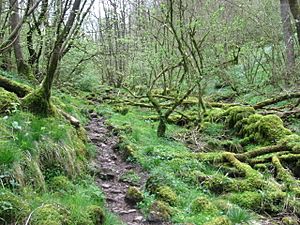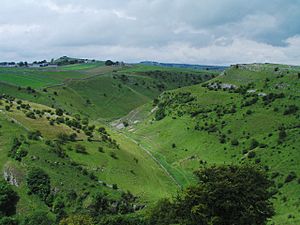Derbyshire Dales National Nature Reserve facts for kids
The Derbyshire Dales National Nature Reserve is a special place in the Peak District National Park. It's made up of several beautiful valleys, called 'dales', which are not connected to each other. These dales are famous for their limestone rocks.
Natural England looks after this reserve. They have a team of dedicated wardens. These wardens work hard to protect nature. They also make sure the dales are safe and fun for everyone to visit.
Contents
What Dales Make Up the Reserve?
The Derbyshire Dales National Nature Reserve includes five main dales. Each one offers unique natural beauty. They are all found in an area called the White Peak.
- Lathkill Dale (53°11′19″N 1°43′33″W / 53.1886°N 1.7257°W)
- Cressbrook Dale (53°15′42″N 1°44′38″W / 53.2617°N 1.7438°W)
- Monk's Dale (53°15′58″N 1°47′59″W / 53.2662°N 1.7997°W)
- Long Dale (53°08′20″N 1°42′59″W / 53.1388°N 1.7164°W)
- Hay Dale (53°17′20″N 1°49′13″W / 53.2890°N 1.8203°W)
What Kind of Nature Can You Find?
These dales are a mix of different natural areas. You will find open grassland, thick woodland, and scrubby bushes. Some dales even have streams flowing through them. These streams are often winterbournes. This means they only flow during wetter times of the year.
The dales are a fantastic place for biodiversity. This means they are home to many different kinds of plants and animals. Many parts of the reserve are also special areas. They are called Sites of Special Scientific Interest (SSSI). These sites are protected because of their unique wildlife or geology.
Amazing Plants and Animals
You can spot many interesting creatures here. Dippers are birds often seen along the River Lathkill. They dive into the water to catch food. You might also see large birds like ravens and buzzards flying overhead.
Lathkill Dale is famous for a beautiful flower called Jacob's ladder (Polemonium caeruleum). While it's common in gardens, it's quite rare to find it growing wild. Many different types of orchids also grow across all the dales.
Discovering Geology and History
The Derbyshire Dales are also a great spot to learn about geology. The limestone rocks contain many ancient fossils. These fossils tell us about life from millions of years ago.
The dales also have a rich history. Lathkill Dale, for example, has many old industrial sites. These are now abandoned, but they show how people used to work here. There are special signs in the dale. They explain the history of these old workings.
How Easy Is It to Visit the Dales?
Some dales are easier to explore than others. Lathkill Dale is one of the most popular. It has good paths for a long way. This makes it easy for most people to visit.
However, other dales can be quite challenging. Monk's Dale, for instance, has very steep and rocky paths. This means it can be hard for people who have trouble walking. Always check the path conditions before you go!
 | Audre Lorde |
 | John Berry Meachum |
 | Ferdinand Lee Barnett |



